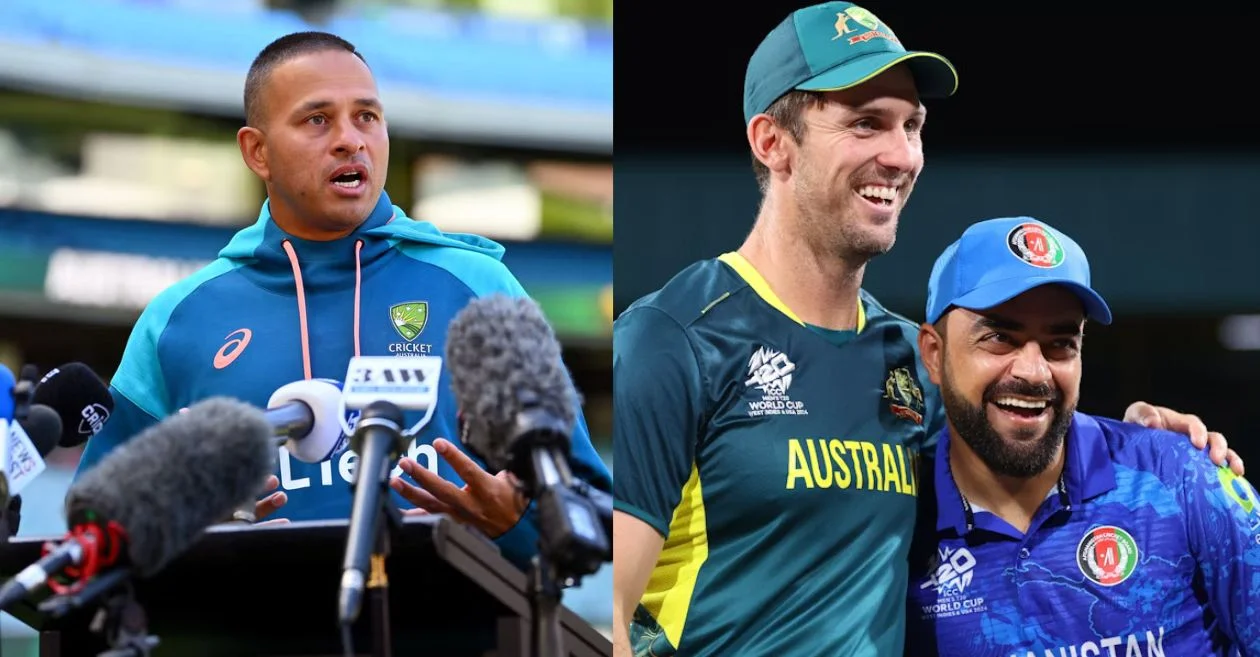Usman Khawaja Criticizes Cricket Australia’s Decision to Boycott Bilateral Series with Afghanistan
In recent developments that have stirred the cricketing community, Usman Khawaja, a prominent opener for the Australian Test cricket team, has voiced his displeasure with Cricket Australia’s (CA) decision not to engage in bilateral series with Afghanistan. Khawaja’s remarks have brought renewed attention to the intersection of sports and international politics, as well as the future of cricketing relations between Australia and Afghanistan. His statements have sparked a broader debate on the role of sports in promoting human rights and the responsibilities of cricketing boards.
Cricket Australia’s Stance: A Human Rights Perspective
Cricket Australia has justified its stance by highlighting human rights issues in Afghanistan, particularly the treatment of women and girls under the Taliban regime. Since the Taliban’s return to power in 2021, there have been significant restrictions on women’s participation in sports and education. CA believes that by refusing to play bilateral matches with Afghanistan, they can exert pressure on the Taliban to improve the human rights situation.
This decision reflects CA’s commitment to upholding certain ethical standards and using its influence to advocate for change. However, this approach has also raised questions about the effectiveness of such measures and the broader implications for Afghan cricket and its fans.
Usman Khawaja Acknowledges Afghanistan’s Success
Khawaja demonstrated his sportsmanship by applauding the Afghan cricket team following their significant victory over Australia in the Super 8 stage of the T20 World Cup 2024. This win, the most significant in Afghanistan’s cricket history, showcased their talent and perseverance. Khawaja acknowledged their achievement and hard work, emphasizing the quality of their performance against one of the leading cricket nations.
“Well done Brother. Better team on the day. You boys are an inspiration for so many back home and abroad. So sad we can’t see you all play in Australia,” Khawaja wrote on X (formerly Twitter). His message highlighted not only the Afghan team’s success but also the broader impact of their performance on cricket fans globally.
Advocacy for Bilateral Cricket with Afghanistan
In a recent interview, Khawaja advocated for Australia to play cricket with Afghanistan. While he respected Cricket Australia’s concerns about women’s rights in Afghanistan, he stressed the importance of promoting and nurturing the sport. “I personally think yes, we should be playing Afghanistan. I am sympathetic to both sides of the puzzle. I totally respect and agree with a lot of aspects of the stance Cricket Australia has in terms of women’s cricket in Afghanistan, but there’s also another side to it, of promoting and growing the game,” Khawaja told Nine Newspapers in Melbourne.
Khawaja’s advocacy highlights a complex issue: balancing ethical concerns with the promotion of sports. His perspective suggests that engaging with Afghanistan through cricket could offer a platform for positive change and inspire hope among Afghan people.
The Impact on Afghan Cricket and Fans
Khawaja also pointed out the disappointment among Afghan players and fans, noting that cricket is a significant source of joy in Afghanistan. He argued that the Afghan people should not be penalized for their government’s actions. “This is the second time Australia have backed out of a bilateral series, and I talked to Rashid Khan. He was really disappointed, more so because the Afghanistan people love cricket, and for them, cricket is one of the few things they enjoy and brings happiness, and the fact they were going to play Australia was going to be huge, and they don’t get to see that now. So it actually hurts the people, and the people are separate from the government,” he added.
Khawaja’s comments underscore the importance of cricket as a unifying force in Afghanistan, providing a sense of normalcy and joy amidst challenging circumstances. The cancellation of matches deprives Afghan fans of opportunities to see their heroes compete on the international stage.
The Broader Debate: Sports and Politics
Khawaja’s criticism of CA’s decision has reignited the debate over the intersection of sports and politics. While some argue that sports should be used as a tool to promote human rights and ethical standards, others believe that sports should remain separate from political issues and focus on bringing people together. This debate is not new, but it has gained fresh urgency in the context of Afghanistan’s current political situation.
Engaging Afghanistan in cricket could be seen as a way to support the country’s cricketing infrastructure and offer a positive distraction for its people. Conversely, boycotting bilateral series can be viewed as a stand against human rights violations. Both perspectives have merit, making it a complex issue with no easy answers.
The Future of Australia-Afghanistan Cricket Relations
The future of cricketing relations between Australia and Afghanistan remains uncertain. CA’s decision to boycott bilateral series has significant implications for both teams. For Australia, it reflects a commitment to ethical standards, but it also raises questions about the effectiveness of such boycotts. For Afghanistan, it means missed opportunities for their players to compete against top-tier teams and for their fans to enjoy high-quality cricket.
Khawaja’s advocacy for playing bilateral series with Afghanistan suggests a possible middle ground: engaging with Afghan cricket while continuing to advocate for human rights. This approach could help maintain cricketing ties and provide a platform for positive change.
A Call for Balanced Approach
Usman Khawaja’s criticism of Cricket Australia’s decision not to engage in bilateral series with Afghanistan has brought renewed attention to the intersection of sports and international politics. His remarks highlight the complexities of using sports as a tool for promoting human rights and the potential consequences for cricketing relations.
As cricketing bodies navigate these challenges, a balanced approach that considers both ethical concerns and the importance of promoting the sport may offer a way forward. Engaging with Afghanistan through cricket could provide a platform for positive change, inspire hope among Afghan fans, and continue to promote the unifying power of sports.
In the end, Khawaja’s call for Australia to play cricket with Afghanistan is a reminder of the broader impact of sports on societies and the potential for cricket to be a force for good in challenging times.
Please check for information on the best betting sites in India – https://selectory.org/best-betting-sites/
Related posts:
 IPL 2024, DC vs SRH: Arun Jaitley Cricket Stadium Pitch Report, Delhi Weather Forecast, T20 Stats & Records | Delhi Capitals vs Sunrisers Hyderabad
IPL 2024, DC vs SRH: Arun Jaitley Cricket Stadium Pitch Report, Delhi Weather Forecast, T20 Stats & Records | Delhi Capitals vs Sunrisers Hyderabad
 Sunil Narine opens up on his T20 World Cup return after performing exceptionally well in IPL 2024
Sunil Narine opens up on his T20 World Cup return after performing exceptionally well in IPL 2024
 IPL 2024, GT vs CSK: Narendra Modi Stadium Pitch Report, Ahmedabad Weather Forecast, T20 Stats & Records | Gujarat Titans vs Chennai Super Kings
IPL 2024, GT vs CSK: Narendra Modi Stadium Pitch Report, Ahmedabad Weather Forecast, T20 Stats & Records | Gujarat Titans vs Chennai Super Kings
 IPL: Kochi Tuskers Kerala didn’t pay money to cricketers, reveals former India pacer S. Sreesanth
IPL: Kochi Tuskers Kerala didn’t pay money to cricketers, reveals former India pacer S. Sreesanth
 IPL 2024: ‘Facetime me with the trophy’: Jos Buttler’s message before leaving the Rajasthan Royals camp for England duty
IPL 2024: ‘Facetime me with the trophy’: Jos Buttler’s message before leaving the Rajasthan Royals camp for England duty
 IPL 2024: Punjab Kings’ Kagiso Rabada and Liam Livingstone return home due to different reasons
IPL 2024: Punjab Kings’ Kagiso Rabada and Liam Livingstone return home due to different reasons
 In Pics: Meet Erin Holland – Ben Cutting’s wife who is doing anchoring in IPL 2024
In Pics: Meet Erin Holland – Ben Cutting’s wife who is doing anchoring in IPL 2024
 IPL 2024, RCB vs CSK: Mohammad Kaif names the bowler who could stop MS Dhoni in death overs
IPL 2024, RCB vs CSK: Mohammad Kaif names the bowler who could stop MS Dhoni in death overs
 T20 World Cup 2024: Controversial umpiring decision leaves Towhid Hridoy frustrated after Bangladesh’s narrow loss to South Africa
T20 World Cup 2024: Controversial umpiring decision leaves Towhid Hridoy frustrated after Bangladesh’s narrow loss to South Africa
 BAN vs NED, T20 World Cup: Match Prediction, Dream11 Team, Fantasy Tips & Pitch Report | Bangladesh vs Netherlands 2024
BAN vs NED, T20 World Cup: Match Prediction, Dream11 Team, Fantasy Tips & Pitch Report | Bangladesh vs Netherlands 2024
 T20 World Cup 2024: Imam-ul-Haq fires back at Ahmed Shehzad’s ‘Fake King’ comment on Pakistan captain Babar Azam
T20 World Cup 2024: Imam-ul-Haq fires back at Ahmed Shehzad’s ‘Fake King’ comment on Pakistan captain Babar Azam
 Horse Racing Betting: Tips and Strategies for Winning Wagers
Horse Racing Betting: Tips and Strategies for Winning Wagers
 BetOnline Betting: Your Ultimate Guide to Online Sports Betting
BetOnline Betting: Your Ultimate Guide to Online Sports Betting
 T20 World Cup 2024 : Rohit Sharma powerfully thrashes Mitchell Starc in a 29-run over during AUS vs IND game
T20 World Cup 2024 : Rohit Sharma powerfully thrashes Mitchell Starc in a 29-run over during AUS vs IND game
 ICC announces match officials for the semifinals of T20 World Cup 2024
ICC announces match officials for the semifinals of T20 World Cup 2024
